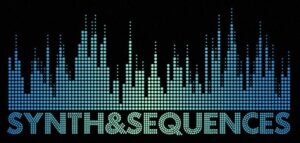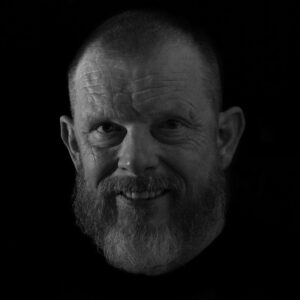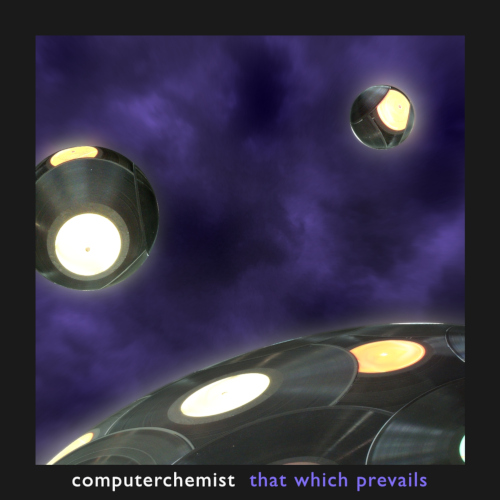For this, his ninth solo album, computerchemist has gone back to guitar and synthesizer, producing 5 new tracks harking back to the strong 70’s influences of Krautrock and Berlin School, such as Tangerine Dream and AshRa Tempel. With guest appearances again from Zsolt Galántai (MAYA,Rusty Gold,Ossian) this album is sure to hit the sweet spot for fans of ‘old school’ synthesizer music.
Bruce Gall’s show ‘Atmospheres’ on oneworldmusic.co.uk exclusively premiered the album, together with an interview with Dave, in two parts starting from January 30th, 2020.
Label: Terrainflight TF011
Release Date: 1st February, 2020
Track listing:
- the circumstances beyond one’s control 17:32
- time is a great healer (parts III-IV) 05:28
- that which prevails 14:00
- a dali-esque dreamer 10:34
- the end of times 11:31
- the pink beams of light, he said (bonus) 07:10
- that which prevails (mix 44) (bonus) 13:49
- that which prevails (mix 73) (bonus) 14:00
- atmospheres radio interview – that which prevails premiere (bonus) 01:06:26
dave pearson: keyboards, bass & lead guitars, sequencer & drum programming
zsolt galántai: drums on track 3
artwork: angiewoman
all composing, mixing and mastering in the digital domain at terrainflight hungary between jul 2019 and jan 2020
written & produced ©℗ 2020 by dave pearson
thanks: my wife and family, chris gill for the feedback, bonzo, bruce, craig, jerry, kelrod, paul & anita and all the others for the support, and of course TD for steering me onto EM for life 🙂
contacts:
terrainflight: info@terrainflight.com
dave: www.computerchemist.com
zsolt: www.soundcloud.com/zsolthy65
Reviews
Eduard Meyer – Cellist and former Hansa Studios recording engineer

Born ‘Edu’ in 1943, Meyer studied recording engineering and music at the Robert Schumann Konservatorium in Düsseldorf. After a stint recording “mainly Schlager” at Cornet Studios in Cologne, he worked at Berlin’s iconic Hansa Studios from 1976-2003, working with such musical luminaries as Can, Tangerine Dream and David Bowie. Also an accomplished cellist, Meyer played on the Bowie Low track “Art Decade”, as well as on Tangerine Dream’s iconic “Force Majeure”. He is currently enjoying his retirement in rural North Rhine-Westphalia.
It arrived just this moment, and I started listening to “circumstances beyond one’s control”, and I like it already. You have made a great album! There should be millions of fans to buy it. It’s only a question of commercializing it globally.
I have now listened to the whole album and the more I listened, the more I liked it. It has a great variety of sounds, and I especially like the sound of the double speed guitar and the choice of the sounds of the sequencers. Also the appearance of original drum sound is a highlight for the whole album. I think that our audiences like to listen to natural instruments besides all the EM sounds. My congratulations!
— Eduard Meyer, Cellist and former Hansa Studios recording engineer, 11 February 2020
Juergen Meurer – betreutesproggen.de (DE)

Erst kürzlich fiel der Name “Computerchemist“ in Zusammenhang mit einem Duo namens Audio-Cologne Project, deren eine Hälfte eben der sich Computerchemist nennende, in Ungarn lebende britische Elektronikmusiker Dave Pearson ist.
Hier nun also solo, und das vorliegende „That Which Prevails“ ist nun wahrlich nicht sein Debüt als Solokünstler – nein, er hat bereits so einige Alben auf seinem Kasten, wie ein Blick auf seine Bandcamp-Seite (vgl. Surf-Tipps) schnell verrät. Im vorliegenden Fall handelt es sich um sein mittlerweile neuntes Soloalbum.
Gleich zum Auftakt wird den Spät-70er Tangerine Dream gehuldigt, und zwar auf über 17 Minuten im Opener ‚The Circumstances Beyond One’s Control‘. Das erinnert nicht nur stark an TD zu Zeiten von „Force Majeure“, sondern agiert auch auf dem gleichen hohen Niveau. Was zunächst mit Sequenzern in typischem Berliner Schule Stil startet, wird zunächst durch eine elektrische Gitarre ergänzt, später kommen dann Mellotron-Sounds hinzu, und der Track entwickelt sich zu einer hochklassigen Nummer besagter Berliner Schule.
Im zweiten Song kommt gerade durch das Gitarrenspiel eine ordentliche Portion Pink Floyd hinzu, gut vergleichbar mit einigen Alben von Otarion, der in ähnlicher Weise agierte. Doch die Mischung aus EM und Pink-Floyd-Reminiszenzen ist noch nicht alles, was geboten wird. Der 14-minütige Titelsong erweist sich als langgedehnte Krautrock-Jam-Session, in der die Gitarre eine dominante Rolle spielt. Danach wieder der Schwenk zurück zur Elektronischen Musik, die immer wieder mal durch progressive Elemente ergänzt wird.
Dave Pearson – keyboards / bass guitar / lead guitars / sequencer / drum programming
Zsolt Galántai – drums auf dem Titelsong.
Die CD-Version ist aktuell anscheinend bereits ausverkauft, die Download-Variante enthält noch zusätzliche Musik.
Ein abwechslungsreiches Album, das Fans von Tangerine Dream oder AshRa gefallen sollte, ebenso aber auch alle Freunde instrumentaler Musik in einer Schnittmenge aus EM, Krautrock und Progressive Rock ansprechen dürfte.
Bewertung: 11/15 Punkten
— Von Juergen Meurer, am 19. September 2020
https://www.betreutesproggen.de/2020/09/computerchemist-that-which-prevails
Juergen Meurer – betreutesproggen.de (EN translation)

Only recently the name “Computerchemist” came up in connection with a duo called Audio-Cologne Project, one half of which is the Hungarian-based British electronic musician Dave Pearson, who calls himself Computerchemist. So here he is solo, and this “That Which Prevails” is by no means his debut as a solo artist – no, he already has quite a few albums under his belt, as a glance at his Bandcamp page (cf. Surf Tips) quickly reveals. In the present case it is about his ninth solo album.
Right at the start, homage is paid to the late 70s Tangerine Dream for over 17 minutes in the opener ‘The Circumstances Beyond One’s Control’. This is not only strongly reminiscent of TD in the days of “Force Majeure”, but also acts on the same high level. What starts with sequencers in the typical Berlin School style is first supplemented by an electric guitar, later Mellotron sounds are added and the track develops into a high-class number of the said Berlin School. In the second song, the guitar playing adds a good dose of Pink Floyd, comparable to some of Otarion’s albums, who acted in a similar way.
But the mixture of EM and Pink Floyd reminiscences is not all that is offered. The 14-minute title track turns out to be a lengthy Krautrock jam session in which the guitar plays a dominant role. Then the swing back to electronic music, which is always supplemented by progressive elements.
Dave Pearson – keyboards / bass guitar / lead guitars / sequencer / drum programming Zsolt Galántai – drums on the title track.
The CD version is apparently already sold out, the download version contains additional music.
A varied album that should please fans of Tangerine Dream or AshRa, but should also appeal to all friends of instrumental music in an intersection of EM, Krautrock and Progressive Rock. Rating: 11/15 points
— Juergen Meurer, September 19, 2020
Sylvain Lupari – Synths & Sequences

It’s a suite to Volcan Dreams, with a slightly more progressive than electronic vision on which are hiding gorgeous moments of EM. Computerchemist is one of the nice discoveries that I embraced with my ears in 2019. The album Volcan Dreams and its judicious mix between Berlin School, cosmic rock and progressive music was a true revelation and is part of my Top 10 of 2019. What to expect with THAT WHICH PREVAILS? ‘The Circumstances Beyond One’s Control’ is a good clue! Layers slippering from cosmos infiltrate the ears. Their radiances and the slow staccato in the falls hide a sequencer bed which overflows with keys in the tones of the Jive years. A bed, then a second are structuring two lines of rhythms with visions as divergent as their tones. The bass sequences make 4 keys dance in spiral, camouflaging the main line which has taken refuge in layers of mist and ether with spectral tones on the verge of a nervous breakdown. The movement of the bass sequences is unequivocal; it calls for a heavy and slow rhythm which breaks out with the arrival of percussion 20 seconds after the 2-minute point. the circumstances beyond one’s control therefore embraces an electronic rhythm in the genre of Stratosfear and Force Majeure with this bass line which goes up and down in a heaviness animated by good percussions and burnt down by good guitar solos. In this 17-minute journey, the title goes through a few phases of rhythmic inactivity which allows the music to revitalize its tonal flora. The decor in these moments is made up of Mellotron mist as well as flute chants that wind these benches of mythical mist. A good title, with a few lengths in these phases of atmospheres, which offers an electronic final which refuses to loop the loop.
‘Time is a Great Healer (parts III-IV)’ offers a good cosmic melody à la EarthStar with an ethereal guitar solo singing on a carpet of arpeggios dancing in an ascending vision. The finale throws a veil of poignant intensity with the fall of percussions which create a heavy slow-tempo ideal to welcome the tears of good guitar solos.
‘That Which Prevails’ is a long title more progressive than electronic with a more accentuated use of an organ, bringing this sound so characteristic of progressive music. Vampiric layers of mellotron throws jets of mist and very discreet thin line of voices, gradually extending an aura of medieval poetry on an ostinato rhythmic structure braided on guitar loops and the sequencer. Flirting between a seraphic sweetness and a sometimes-spasmodic flow, the music and its atmospheres visit the 70’s in a vision of space rock where we imagine Pink Floyd and Ashra trying to tame this minimalist rhythmic structure in a garden of musical fog.
‘A Dali-esque Dreamer’ is a superb title that has everything, but everything that seems to be a tribute to Edgar Froese, Stuntman and Pinnacles period. Simply brilliant and the illusion of hearing Edgar is perfect.
‘The End of Times’ structures an ambient rhythm where each sequence is followed by hobbling slightly in an environment of opalescent mist with pads of keyboards which make quite TD. The ambient rhythm progresses like a good magnetizing Berlin School before blossoming hard around the 7 minutes with percussions in heavy-rock mode, well watered by layers of jerky violins and riffs from a meshing of synth/guitar. It sounds like this new Scandinavian heavy-metal and progressive-rock genre from the late 80’s. The rhythmic structure is supported with a little Froese side in the sequencer play. There is no elegiac rest area in the end of times. Only rhythm that mutates finely to reach an explosive final, like that of the circumstances beyond one’s control but better, which places the music in a more electronic context. These last 21 minutes are pure happiness which makes me forget these short lengths described above.
But whatever, THAT WHICH PREVAILS is a continuation of Volcan Dreams with a slightly more progressive than electronic vision. Offered both in a manufactured CD and in a downloadable format, it’s a very good album where cosmic rock looks better here than in its golden years. There are beautiful little gems in this album, justifying the need to listen to it again and thus facilitating its taming. 4/5 stars.
— Sylvain Lupari, Synths and Sequences, 2 February 2020 https://www.synthsequences.com/post/computerchemist-that-which-prevails-2020
Jerry Kranitz

Computerchemist is a solo project from Dave Pearson, an English musician residing in Hungary. That Which Prevails is his ninth album as Computerchemist and follows up last year’s excellent Volcan Dreams.
“The Circumstances Beyond One’s Control” opens the set in Berlin school mode with heavenly astral synths and a syncopated pulse. But after a couple minutes the music launches into space rock mode with a rocking groove and tasty cosmic guitar. The high powered rock is brief but I’m really diggin’ this variably rocking yet overall electronic exploration with all the classic traits of old time Berlin/Kosmiche/Prog. Soaring and drifting flute/mellotron, Tangerine Dreamy grooves, and a succession of cascading, washing synths… it’s all here! (In the credits Dave thanks “TD for steering me onto the EM for life”) 17+ minutes of electronic and rocking space-prog heaven.
“Time Is A Great Healer (Parts III-IV)” is the shortest track of the set but has a nicely catchy dual melody and a spot on Dave Gilmour styled Bluesy guitar lead.
The 14 minute title track opens with a 60s styled organ, that soon morphs into a more classic prog keys sound. Dave’s drummer friend Zsolt Galántai regularly appears on Computerchemist albums and adds a potent rocking beat to this blend of progressive rock, Kosmiche, and more experimental elements. LOTS happening here compositionally and thematically as it twists and turns through a continuously evolving chain of musical events, rocking, throbbing and pulsating the whole way through. My favorite of the set.
I like the playfully uplifting mood on “A Dali-esque Dreamer”, which rocks hard in space but has a joyously whimsical feel.
Finally, “The End Of Times” closes the set with music that…. Imagine Kraftwerk’s “Radioactivity” done up Berlin school/Prog style. That’s just how it struck me. BUT…. Right around the 7 minute mark… BAM!! Out of the blue we BLAST off into the single heaviest moment of the album, full blown Hawkwind space rocking!! It doesn’t last long, as the music recedes back into the earlier theme, but that was a surprise. Nice one Dave!!
— Jerry Kranitz, 23 January 2020
Levente Toth – Notes from a Nebula

Computerchemist’s ninth album is a solid island of complex Berlin School-style electronica in an ocean of myriad other mainstream / trendy electronic music releases. Once again, instead of taking some ‘fashionable’ commercial route, the music is true to its central aesthetic – and delivers on that.
The presence of ‘organic’ instrumentation in the electronic landscape is (or always should be) a very welcomed artistic choice. If one recalls Klaus Krieger’s or Chris Franke’s drumming on Tangerine Dream records, Klaus Schulze’s drumming on his solo albums, or Manuel Göttsching’s guitar improvisations enveloped by Schulze’s electronic textures, then one knows what these combinations can deliver as an experience for the listener.
What we have here is much more electrifying than a purely synthesised soundscape. Dave Pearson’s guitars and the drumming by Zsolt Galántai (of, among others, Ossian fame) adds a vital organic element to the Berlin School sound unfolding in these tracks.
We have tight sequencers, which are captivatingly pulsating and giving structure to the tracks’ lush atmospherics, PPG Wave-like characteristic sonic gems (check out the final track especially), and impossible to resist mellotron-like textures. Everything a Berlin School aficionado could possibly want…
However, in addition we have fluid and, one dares to say, emotive guitar leads, with aforementioned drums on the third track. Even the drum programming on the other tracks feels organic and eminently non-robotic, unlike what happens in some other eminently synthesised, even synthetic, sonic journeys.
It makes the tracks feel more fluid, ever-changing, without static sequencer patterns. Things constantly develop, which is increasingly rare in latter-day Berlin School records & jams inundating the internet.
The opening track is already landing us in catchy Berlin School territory, and characteristically, the sequencers are there to provide structural support to animated electronic rock, rather than totally taking over.
Time Is A Great Healer (parts iii-iv) is another good example where we may believe we are in for a digital trip, as PPG Wave-like sounds open the composition, but then we can quickly take a flight with guitars making a solid appearance…
A Dali-esque Dreamer is a superb homage to Edgar Froese, who passed away five years ago. It once again shows how the tracks do not stand still and there is solid compositional development, whilst keeping an almost improvised feel, too with the guitar leads.
The title track, That Which Prevails is again a perfect example how a retro-sounding organ intro can develop into a fiery electronic rock piece.
Yours truly used to say, even write, about classic TD and Schulze gems that there were no straight lines, only waves and curved surfaces in those records. The same accolade applies to this album, too.
While there is clear compositional thinking with structural development, each track achieves that sense of catchy fluidity that normally only comes with inspired improvisations.
— Levente Toth, Notes from a Nebula, 22 January 2020
https://notesfromanebula.blogspot.com/2020/01/organic-chemistry-that-which-prevails.html
Mike Shipway – Sequences Podcast

Right from the very start, with soaring synthesiser chords and bubbling sequences, the new Computerchemist album promises a powerful excursion into EM and doesn’t disappoint. The opening Berlin School influences are soon reinforced by the addition of guitar and drums so that the 17 minute opening track sets the scene perfectly.
It’s not long before a strong prog influence comes along to blend with the EM style, exemplified by some excellent guitar and drum work that merges the genres, notably on the title track where Zsolt Galántai contributes live drums. The prog influence is further enhanced on this track by steering away from standard 4/4 timing while retaining a driving rhythm.
Sequencing is a strong feature of this album, with the track ‘a dali-esque dreamer’ demonstrating influences from the ‘French’ school rather than from Germany. As with the other tracks on this album, it is only an influence that can be heard here, the track itself is a pure, original Computerchemist work.
Throughout the album there are some clear influences from Berlin School, Prog, Krautrock, etc., but aside from using the typical sounds found in these genres, Dave Pearson has stamped his own identity on this collection of tracks and given Computerchemist a unique start to 2020 with an album which should appeal to fans in all of those genres.
— Mike Shipway, Sequences Podcast, 19 January 2020
John Shanahan – Hypnagogue

Lovers of classic Berlin School electronic music will always have a champion in Computerchemist. On his ninth solo outing, ‘That Which Prevails’, composer Dave Pearson returns to fill headspaces with richly arcing sequencers, floating synth lines, and gritty, blues-dipped guitar. Pearson gives himself room to move, groove, and explore in these prog-tinted excursions, and the story of each song spins itself out in a finely woven sonic narrative. He also keeps his hand on the throttle the whole time, intent on infusing each piece with a range of dynamics and density–and when Pearson goes big, bold, and full, it can be exhilarating. From start to finish, ‘That Which Prevails’ is energetically engaging and laced through with healthy doses of the echoes of Pearson’s classic rock and EM influences– all tied neatly together with the artist’s enduring love of the genre.
— John Shanahan, Hypnagogue Podcast, 5 January 2020
Jos Verboven – Electronic Fusion

The album ‘That Which Prevails’ brings me back to days long gone. The perfect combination of sequencers and guitars that go along with melodic parts and great percussion, clearly show that there is someone at work here who has learned the ropes; a genuine professional! In some tracks I hear a little touch of Tangerine Dream but with a very personal twist, that is what makes ‘That Which Prevails’ a beautiful journey, at least for me.
Music that is able to let me drift away from daily life, is music that is very precious to me. Music is about feeling and emotion. Being able to put these things into music, is a true gift. Computerchemist masters these skills perfectly well. Five stars!
— Jos Verboven aka Brainvoyager, Electronic Fusion, 18 January 2020
Bruce Gall – OWMR Atmospheres

A new year, and a brand new release from computerchemist! Hot on the heels of the relatively recent ‘Volcan Dreams’, Dave Pearson releases ‘That Which Prevails’ which continues not just in the vein of Edgar Froese-era Tangerine Dream, but will also interest fans of prog rock, psychedelic, krautrock and Berlin school with lots of references to their classic periods.
No twee new-age stuff on this recording, so stand by your keyboards for this hour-long trip. The first and last tracks on the album (‘The Circumstances Beyond One’s Control’ and ‘The End of Times’) take up almost 30 minutes and are CC classics, so it’s worth the money just for these two pieces. In my humble opinion the last two albums from computerchemist have really catapulted Dave Pearson into the premier league with this style of music with all but one track being long-form pieces which develop and grow as they progress into the familiar computerchemist crescendo.
It’s amazing to think this is for the most part a one-man project apart from long-time friend Zsolt Galántai’s drumming talents on one track. Dave’s music is so often referenced alongside Tangerine Dream but the trick he’s developed is to combine the periods that he enjoyed from the band and mix all these elements with the backbone of his own inimitable style. It’s only January but computerchemist has already set the bar very high for the rest of the year.
– Bruce Gall, “atmospheres” www.oneworldmusic.co.uk, 15 January 2020
Alfred Arnold – EMpulsiv.de (DE)
Neues aus dem ungarischen Elektronik-Labor: Gleich zum Jahresanfang meldet ‘Computerchemist’ Dave Pearson sich mit einem neuen Album zurück. “Das was vorherrscht”, ist der vielsagende Titel, und die Credits an die bekannten Berliner Elektronik-Pioniere auf dem Cover kommt nicht von ungefähr.
Wer hier aber lupenrein dahinfließende Sequenzen a la ‘Rubycon’, oder melodisch-geschmeidiges Material im Stile der 80er erwartet, der liegt nicht ganz richtig. Die Mehrzahl der Tracks erinnern an die späten 70er-Jahre, als Tangerine Dream begann, nach neuen Musikformen zu suchen und dabei auch progressiv-rockige Elemente auf den Alben zuließ.
Dabei ist dieses Album kein einfaches ‘Tribute’ an diese Ära, der Mix ist individuell und zitiert die Sounds aus der Zeit, ohne als simple Kopie daherzukommen. Als “Erholung” von den gitarrenlastigeren Tracks stellt Dave auch mal einen Titel dazwischen, in dem der Sequenzer dominiert, und glättet die Wogen ein wenig.
Wer schon seinerzeit bei ‘Cyclone’ oder ‘Force Majeure’ nicht spontan abgeschaltet hat, der sollte sich “That with Prevails” einmal genauer anhören, wenn es Anfang Februar erscheint. Elektronik und Krautrock gehen noch immer zusammen, ganz besonders wenn wie hier die Mischung stimmt.
— Alfred Arnold, EMpulsiv.de, 13 January 2020
Alfred Arnold – EMpulsiv.de (English translation)
News from the Hungarian electronics laboratory: right at the beginning of the year, the ‘computerchemist’ Dave Pearson is back with a new album. “That Which Prevails” is the meaningful title, and the credits to the well-known Berlin electronic pioneers on the sleeve notes are no mere coincidence.
But don’t expect perfectly flowing sequences a la ‘Rubycon’, or melodically smooth material in the later style of the ’80s. The majority of the tracks here are much more reminiscent of the late ’70s era, when Tangerine Dream started exploring new forms of music, and where they allowed progressive rock elements to appear.
The album is not a simple ‘tribute’ to this era, however. The mix is individual and quotes the sounds from the time without coming along as a simple copy. As a “recovery” from the more guitar-heavy tracks, Dave sometimes interposes a title in which the sequencer dominates and smoothes the waves a little.
If you don’t switch off spontaneously at the likes of ‘Cyclone’ or ‘Force Majeure’, you should listen to “That with Prevails” more closely when it appears at the beginning of February. Electronics and Krautrock still go together, especially if the mix is right, as here.
— Alfred Arnold, EMpulsiv.de, 13 January 2020 (English translation by google – any corrections are welcome!)
Paul Baker – Soundscapes

Following on from ‘Volcan Dreams’ comes ‘That Which Prevails’, Computerchemist’s ninth album which does start with a rather ‘analogue’ feel, harking back to the ‘classic period’, but not completely. Drums, guitar and a driving bass line soon weave magic in between the sequences and ‘pads’, (whatever they are!)
The opener, ‘The Circumstances Beyond One’s Control’, grows, the chemistry appearing to react with each new musical substance added to the mix. The rhythm of the piece is taken up by drums giving the keys and guitar room to effervesce and bubble into life, taking the music in unexpected directions.
OK, I’ll try and stop the corny Chemistry puns, but that is how this album feels, the music has room to react, to breathe to develop, under the careful, loving, but not too restrictive guidance of the master Chemist. The title track has a catchy rhythm but, what you’ll find here is that you’re soon whistling the ‘melody’ or hook as the piece develops. A splash of Hammond, a pinch of guitar, that bass line all coming together wonderfully in the petri dish, or test tube of free flowing progressive musical chemistry.
If you have to pigeonhole your music, think latter day Ozrics jamming with Gong, with a side salad of Greenslade and a dash of Glen Main. Don’t go investing in capes though, Dave soon brings you back to what this is, Computer Chemist, modern forward thinking electronic music that engages and delights, using all the ‘tools’ at his disposal to keep you guessing where the music is going to go and what you’ll find when you get to the end. Simply marvellous. 5/5 stars.
— Paul Baker, Soundscapes, 12 January 2020
José Luis Martinez Arilla – Descubre LA CAJA DE PANDORA (ES)

El problema de publicar un trabajo tanto a finales de año como a principios del mismo es que corren el peligro de olvidarse bien por tardíos bien por tempraneros. No obstante, la calidad de algunos de ellos supone que no puedan ser desterrados de nuestras cabezas no en uno sino en varios años. Este es el caso del nuevo trabajo del sintetista británico asentado en tierras magiares, Dave Pearson.
No hace mucho, allá por el mes de marzo del año pasado, Computerchemist publicó su excelente, emotivo y artesano Volcan Dreams, un ejercicio generoso a partir de teclados analógicos por recuperar aquel espíritu setentero de lo que se dio a conocer como la Escuela de Berlín. Pero puedo asegurar, tras las ininterrumpidas escuchas de esta maravillosa obra que estrena el 2020 que estamos ante un ejercicio esencial de simbiosis progresiva y escuela de altos vuelos electrónicos espaciales.
Este That wich Prevails se desvela como un artefacto melódico con estructuras complejas que oscilan entre las esencias floydianas, tanto en los desarrollos lánguidos y extensos hasta el infinito como en las guitarras gilmourianas, y las pautas estratosféricas establecidas por aquel trío inmortal que estaba compuesto por Franke, Froese y Baumann.
Y es que a los inteligentes recorridos secuenciados, se les unen melodías exquisitas llenas de texturas maravillosas y cálidas que engrandecen ese universo creado por Pearson. Además, se revela, como en trabajos anteriores, totalmente recomendados, como un estupendo, técnico, templado y pleno de aliento guitarrista que sabe, como pocos, desarrollar prolongados y melancólicos espacios de belleza inagotable.
Destacar temas sería un pecado puesto que el álbum es redondo de principio a fin ya que desde un constante flujo de ideas, la música se va haciendo cada vez más inmensa, como si se tratara de la construcción de una catedral sonora destinada a permanecer firme con el transcurso de las edades.
Obra maestra del progresivo con marcados tintes electrónicos y sinfónicos, el álbum que nos ocupa será uno de los mejores publicados por nadie en su género y servirá de referencia para esta década, y posteriores, me atrevería a afirmar, como ejemplo de composición melódica, ejecución cuasi angelical e inteligencia creativa: un disco entrañable, acogedor, lleno de esencias y sentimiento. Un doce sobre diez.
— José Luis Martinez Arilla, Descubre LA CAJA DE PANDORA, 26 March 2020
https://descubrelacajadepandora.blogspot.com/2020/01/computerchemist-that-which-prevails.html
José Luis Martinez Arilla – Descubre LA CAJA DE PANDORA (English Translation)

The problem of publishing a work both at the end of the year and at the beginning of it is that they are in danger of forgetting well because of late or good because of early ones. However, the quality of some of them means that they cannot be banished from our heads not in one but in several years. This is the case of the new work of the British synthesist based in Magyar lands, Dave Pearson.
Not long ago, back in March last year, Computerchemist published its excellent, emotional and artisan Volcan Dreams, a generous exercise from analog keyboards to recover that seventies spirit of what became known as the Berlin School . But I can assure, after the uninterrupted listening of this wonderful work that premieres in 2020 that we are facing an essential exercise of progressive symbiosis and school of high space electronic flights.
‘That which Prevails’ is revealed as a melodic artifact with complex structures that oscillate between the Floydian essences, both in languid and extensive developments to infinity as in the Gilmourian guitars, and the stratospheric patterns established by that immortal trio that was composed of Franke , Froese and Baumann.
And the intelligent sequenced tours are joined by exquisite melodies full of wonderful and warm textures that enhance that universe created by Pearson. In addition, it is revealed, as in previous works, fully recommended, as a great, technical, tempered and full of guitarist’s breath that knows, as few, develop long and melancholic spaces of inexhaustible beauty.
Highlighting themes would be a sin since the album is round from beginning to end since from a constant flow of ideas, music is becoming increasingly immense, as if it were the construction of a sound cathedral destined to remain firm with the course of the ages.
A progressive masterpiece with marked electronic and symphonic elements, the album that concerns us will be one of the best published by anyone in its genre and will serve as a reference for this decade, and later, I would dare to affirm, as an example of melodic composition, execution Quasi angelic and creative intelligence: an endearing, cozy album, full of essences and feeling. Twelve out of ten.
— José Luis Martinez Arilla, Descubre LA CAJA DE PANDORA, 26 March 2020 (English translation by google – any corrections are welcome!)

